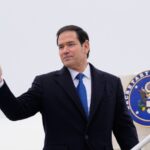

West Virginia has notified six banks that it could ban them from state contracts because it appears they are engaged in “boycotts” of fossil fuel companies.
Riley Moore, the West Virginia state treasurer, notified the firms and said they would be added to West Virginia’s restricted financial institution list in 45 days unless they can demonstrate to Moore’s office that they are not engaged in a boycott of fossil fuel companies.
The financial institutions notified were Citibank, TD Bank, BMO Bank, Fifth Third Bank, Northern Trust, and HSBC Holdings. The state has already placed five firms on its restricted institutions list — BlackRock, Goldman Sachs, JPMorgan Chase, Morgan Stanley, and Wells Fargo. The five firms on the list have lost access to some $18 billion in annual inflows and outflows.
“They can make their case,” Moore said of the six new firms during an interview with the Washington Examiner, noting the 45-day deadline. Moore, who is also running for Congress this year, noted that the first time he sent out warning letters to firms, U.S. Bank changed its no-lending policy to the fossil fuel industry so that it was not included on the list.
“I’m not prejudging any of them, but our suspicion is that they are, by their own admission, boycotting the fossil fuel industry,” Moore said, “which, we’re not doing business with any banks that are doing that.”
The move is just another push in a larger Republican broadside against environmental, social, and governance practices, known as ESG, which has been a growing priority for corporations and financial institutions over the years.
The shift away from fossil fuels is part of the larger corporate move toward the prioritization of ESG goals. Proponents argue that ESG is a way finance and business can help reform society, such as by mitigating the effects of climate change. Those who oppose ESG say it distorts the economy and even the culture.
Several other states have pushed back on ESG. For instance, several Republican-led states have divested or announced planned divestments of hundreds of millions of dollars from BlackRock, which is led by CEO Larry Fink.
CLICK HERE TO READ MORE FROM THE WASHINGTON EXAMINER
In BlackRock’s case, the GOP pushback might have made some headway. An annual report from last year revealed that BlackRock supported just 7% of nearly 400 shareholder proposals on environmental and social matters.
Also, Fink’s annual letter this year didn’t include one mention of ESG and deemphasized talk about the climate, saying that companies aren’t “the environmental police,” a tone shift from recent years as GOP pushback grows.







